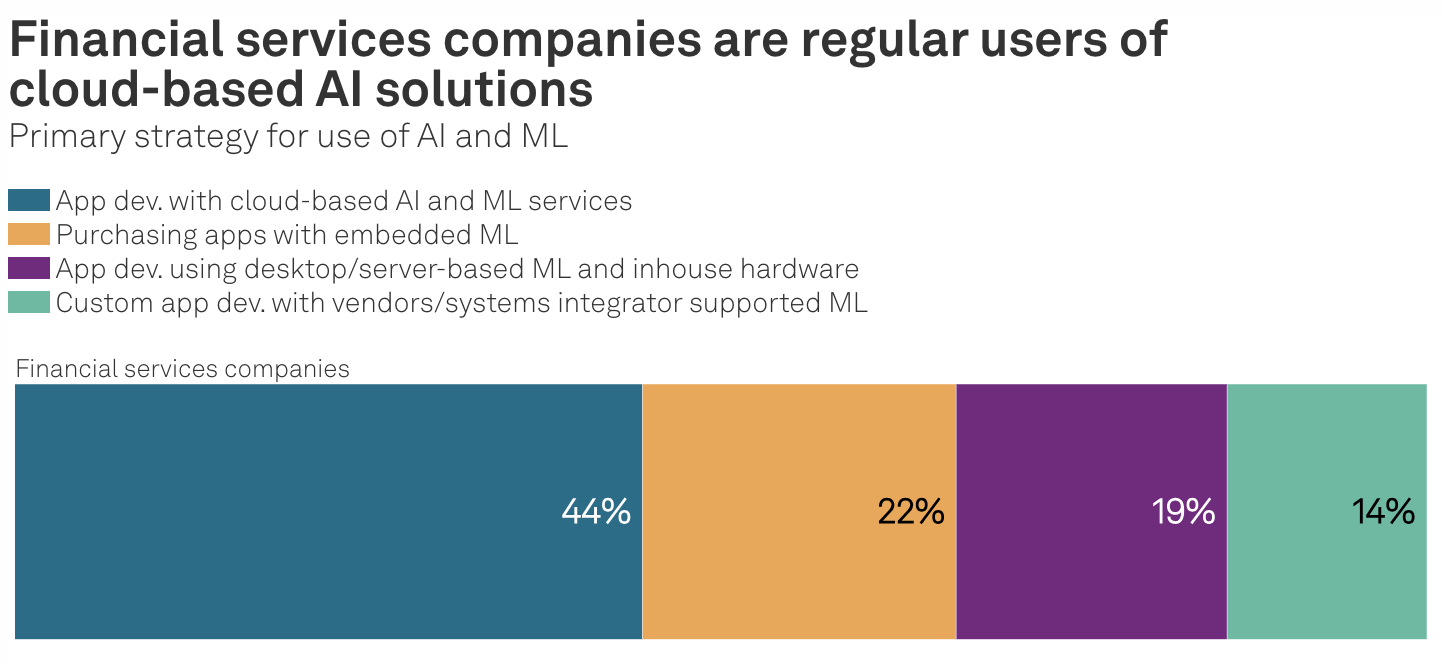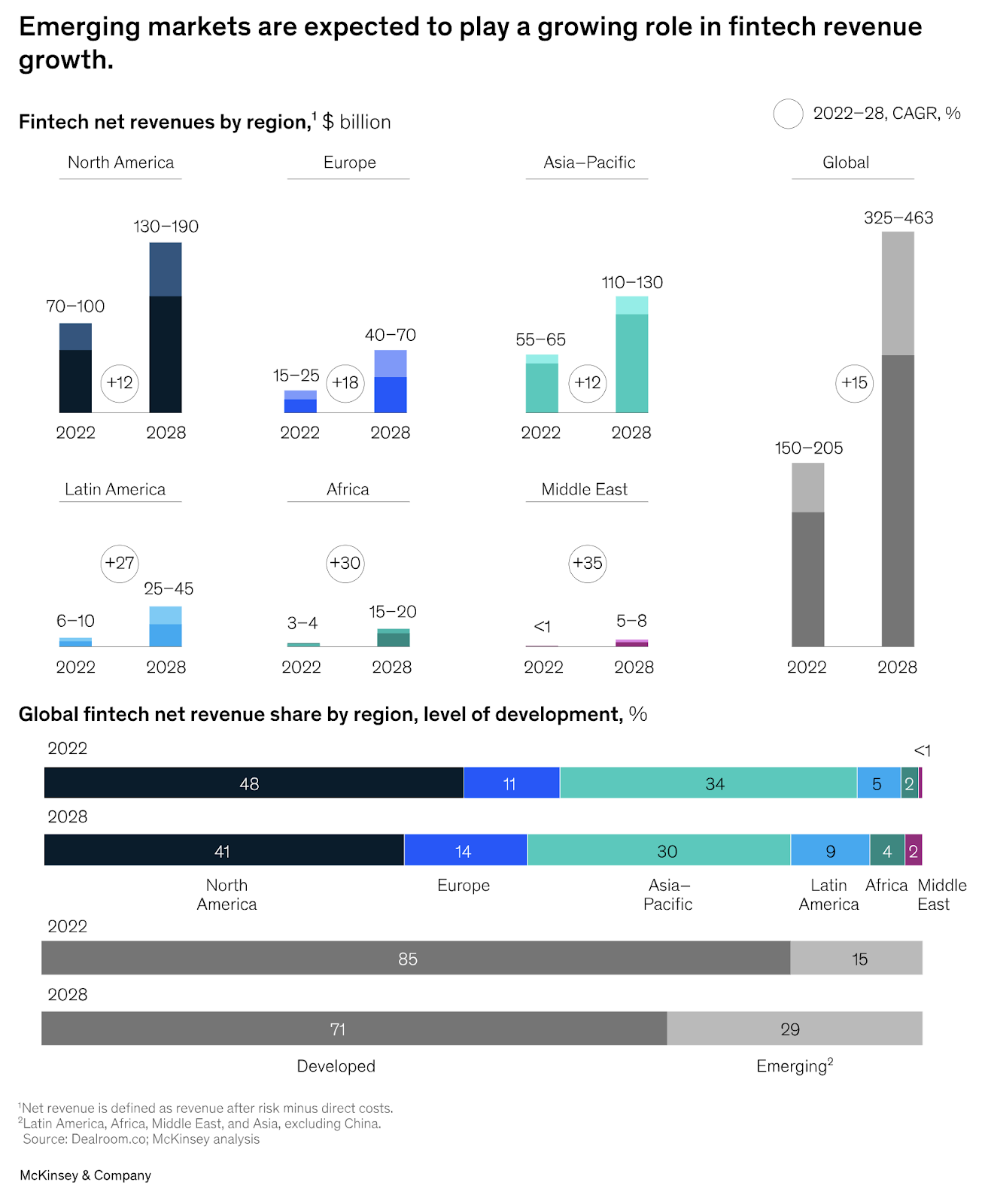Fintech
How technology is reshaping the financial services landscape

Fintech has been driving change in financial services for more than a decade, attracting multi-billion-dollar investments along the way. Recent quarters have seen a slowdown in the rate of deal closures, but fintech innovation remains a very powerful economic driver across the global economy.
Finding the right concentration
Source: Pulse of Fintech, KPMG’s semi-annual analysis of global fintech financing
Despite some easing in the pace at which fintech investments are being made, there is no shortage of investor optimism in this space and there is every reason to expect that fintech will continue to help shape the evolution of the financial services sector over the of the current decade and beyond.
In particular, there is now enormous interest in the potential integration of AI and particularly generative AI technologies into financial service offerings at all levels. Meanwhile, the transition to “open banking” and data sharing in the interest of dramatically improving consumer experiences continues to underpin technology-driven evolutions of payment systems, savings apps and lending solutions alternatives.
Continuous impacts
The pace and way in which fintech solutions are integrated into financial services differs across regions and regulatory environments, with consumer demands, security concerns and data protection considerations influencing how they take shape specific markets. But with fintech’s ability to improve everything from payment processing speed to fraud detection standards, and reduce costs while strengthening customer experiences, the scope for impactful innovation in this sector remains wider than ever.
Challenges to overcome
While fintech innovators are generally busy finding ways to offer solutions to problems, the industry as a whole has been hit by some unavoidable headwinds of late. In fact KPMG, in itslet’s look at the fintech landscape looking ahead to 2024, he describes the sector as facing “a storm of global challenges”. These problems have generally been caused by macroeconomic factors such as stubbornly high inflation rates, in many parts of the world, coupled with unnecessary increases in financing costs.
All eyes on artificial intelligence

Source: Artificial Intelligence in Banking: Artificial Intelligence Will Be an Incremental Game Changer by S&P Global
Looking ahead, as inflation generally continues to decline throughout 2024, the environment for investors is expected to improve, with AI-driven technology representing a clear and bright step in the landscape. Indeed, artificial intelligence looks set to make a big contributionthe next wave of fintech developments. Certainly from an investment perspective, the financial services industry is supporting AI in a big wayJuniper research predicting that generative AI investments among banks will be worth $85 billion globally by 2030, up from $6 billion expected to be in those areas in 2024.
For now, the focus of AI investments in financial services is often on easy wins through efficiency gains, but with technology evolving so rapidly, more impactful innovations and changes for entire business models are also very in sight. As Vice President of IDC’s Global Research Group Rick Villars explains: “In 2024, the shift to AI will enter a critical phase everywhere as companies make major new investments with the goal of dramatically reducing the time and costs associated with customer and employee productivity use cases. From there, the focus will shift to investments that increase revenue and business results.”
Enhance inclusion
More broadly, the emergence of fintech at the heart of the global financial services landscape has been one of the most impactful economic, social and technological evolutions of recent decades. Fintech-driven solutions are now taken for granted and are an integral part of how myriad banking-related activities are undertaken on a daily basis around the world.
Coupled with the onset of the Covid-19 pandemic and the dramatic increase in mobile phone use globally over the past decade, fintech innovation is strengthening financial inclusion around the world, particularly in developing countries. development where many millions of people remain without banking services. According to the World Bank, those same forces and technological advances have helped open access to banking services across all demographics in societies around the world.
Emphasis on value creation
The explosion of fintech startups early in the industry’s evolution has helped transform the landscape of the financial services industry and given rise to what experts at McKinsey & Company describe as“hypergrowth”. More recently, the F-Prime fintech index reported, the sector saw the value of the collective market capitalization of publicly traded fintech companies double to $550 billion between 2019 and July 2023. Over the same period, the number of fintech unicorns worth more than $1 billion has exploded from 39 to 272, McKinsey analysis suggests.
Looking ahead, market expectations are that the focus for innovation among fintech companies will focus more on sustainable value creation rather than experimentation or risk-taking. However, there is little doubt among analysts that fintech companies and investors will continue to play an important role in shaping the financial services landscape, with the adoption of digital banking expected to continue to grow rapidly, e-commerce services -expanding commerce and artificial intelligence driving all kinds of progress.
Notably, even as technology-driven companies focus more on sustainable value creation rather than immediate-impact innovation, McKinsey experts estimate that fintech revenues will grow at a rate nearly three times faster than the traditional banking between 2023 and 2028.

Source: Fintech: A New Growth Paradigm by McKinsey & Company
Competition vs collaboration
The history of fintech has often been one of startups responding to consumer demands that more traditional banks have not been able to meet on their own. This dynamic has fueled cycles of innovation and led to dramatic shifts in the financial services landscape, with traditional banks ultimately forced to respond to protect their market share and keep their customers happy where they can.
By 2024, fintech companies will become a key part of the competitive parameters within which all financial services activities take place, with large banks often working alongside startups to update their offering, particularly regardingpayment processand other times compete against them and try to maximize your advantages.
But whether their efforts are geared towards partnering with established players in the banking industry or against them, there remains enormous scope and potential for fintech companies to continue to make waves across the industry and fundamentally influence how people they bank all over the world.
Fintech
Lloyds and Nationwide invest in Scottish fintech AI Aveni

Lloyds Banking Group and Nationwide have joined an £11m Series A funding round in Scottish artificial intelligence fintech Aveni.
The investment is led by Puma Private Equity with additional participation from Par Equity.
Aveni creates AI products specifically designed to streamline workflows in the financial services industry by analyzing documents and meetings across a range of operational functions, with a focus on financial advisory services and consumer compliance.
The cash injection will help fund the development of a new product, FinLLM, a large-scale language model created specifically for the financial sector in partnership with Lloyds and Nationwide.
Joseph Twigg, CEO of Aveni, explains: “The financial services industry doesn’t need AI models that can quote Shakespeare, it needs AI models that offer transparency, trust and, most importantly, fairness. The way to achieve this is to develop small, highly tuned language models, trained on financial services data, vetted by financial services experts for specific financial services use cases.
“FinLLM’s goal is to set a new standard for the controlled, responsible and ethical adoption of generative AI, outperforming all other generic models in our selected financial services use cases.”
Robin Scher, head of fintech investment at Lloyds Banking Group, says the development programme offers a “massive opportunity” for the financial services industry by streamlining operations and improving customer experience.
“We look forward to supporting Aveni’s growth as we invest in their vision of developing FinLLM together with partners. Our collaboration aims to establish Aveni as a forerunner in AI adoption in the industry, while maintaining a focus on responsible use and customer centricity,” he said.
Fintech
Fairexpay: Risk consultancy White Matter Advisory acquires 90% stake in fintech Fairexpay

Treasury Risk Consulting Firm White Matter Alert On Monday he announced the acquisition of a 90% stake in the fintech startup Fair payment for an undisclosed amount. The acquisition will help White Matter Advisory expand its portfolio in the area of cross-border remittance and fundraising services, a statement said. White Matter Advisory, which operates under the name SaveDesk (White Matter Advisory India Pvt Ltd), is engaged in the treasury risk advisory business. It oversees funds under management (FUM) totaling $8 billion, offering advisory services to a wide range of clients.
Improve your technology skills with high-value skills courses
| IIT Delhi | Data Science and Machine Learning Certificate Program | Visit |
| Indian School of Economics | ISB Product Management | Visit |
| MIT xPRO | MIT Technology Leadership and Innovation | Visit |
White Matter Advisory, based in Bangalore, helps companies navigate the complexities of treasury and risk management.
Fairexpay, authorised by the Reserve Bank of India (RBI) under Cohort 2 of the Liberalised Remittance Scheme (LRS) Regulatory Sandbox, boasts features such as best-in-class exchange rates, 24-hour processing times and full security compliance.
“With this acquisition, White Matter Advisory will leverage Fairexpay’s advanced technology platform and regulatory approvals to enhance its services to its clients,” the release reads.
The integration of Fairexpay’s capabilities should provide White Matter Advisory with a competitive advantage in the cross-border remittance and fundraising market, he added.
The release also states that by integrating Fairexpay’s advanced technology, White Matter Advisory aims to offer seamless and convenient cross-border payment solutions, providing customers with secure options for international money transfers.
Fintech
Rakuten Delays FinTech Business Reorganization to 2025

Rakuten (Japan:4755) has released an update.
Rakuten Group, Inc. and Rakuten Bank, Ltd. announced a delay in the reorganization of Rakuten’s FinTech Business, moving the target date from October 2024 to January 2025. The delay is to allow for a more comprehensive review, taking into account regulatory, shareholder interests and the group’s optimal structure for growth. There are no anticipated changes to Rakuten Bank’s reorganization objectives, structure or listing status outside of the revised timeline.
For more insights on JP:4755 stock, check out TipRanks Stock Analysis Page.
Fintech
White Matter Advisory Acquires 90% Stake in Fintech Startup Fairexpay

You are reading Entrepreneur India, an international franchise of Entrepreneur Media.
White Matter Advisory, which operates under the name SaveDesk in India, has announced that it is acquiring a 90% stake in fintech startup Fairexpay for an undisclosed amount.
This strategic move aims to strengthen White Matter Advisory’s portfolio in cross-border remittance and fundraising services.
By integrating Fairexpay’s advanced technology, White Matter Advisory aims to offer seamless and convenient cross-border payment solutions, providing customers with secure options for international money transfers.
White Matter Advisory, known for its treasury risk advisory services, manages funds under management (FUM) totaling USD 8 billion.
Founded by Bhaskar Saravana, Saurabh Jain, Kranthi Reddy and Piuesh Daga, White Matter Advisory helps companies effectively manage the complexities of treasury and risk management.
The SaveDesk platform offering includes a SaaS-based FX market data platform with real-time feeds for over 100 currencies, bank cost optimization services, customized treasury risk management solutions, and compliance guidance for the Foreign Exchange Management Act (FEMA) and other trade regulations.
Fairexpay is a global aggregation platform offering competitive currency exchange rates from numerous exchange partners worldwide. Catering to both private and corporate customers, Fairexpay provides seamless money transfer solutions for education, travel and immigration, as well as simplifying cross-border payments via API and white-label solutions for businesses. Key features include competitive currency exchange rates, 24-hour processing times, extensive currency coverage of over 30 currencies in more than 200 countries, and secure, RBI-compliant transactions.
-

 DeFi11 months ago
DeFi11 months agoSwitchboard Revolutionizes DeFi with New Oracle Aggregator
-

 News11 months ago
News11 months agoLatest Business News Live Updates Today, July 11, 2024
-

 DeFi11 months ago
DeFi11 months agoIs Zypto Wallet a Reliable Choice for DeFi Users?
-

 DeFi1 year ago
DeFi1 year ago👀 Lido prepares its response to the recovery boom
-

 Fintech11 months ago
Fintech11 months agoFinTech LIVE New York: Mastercard and the Power of Partnership
-

 DeFi11 months ago
DeFi11 months agoEthena downplays danger of letting traders use USDe to back risky bets – DL News
-

 Fintech1 year ago
Fintech1 year ago121 Top Fintech Companies & Startups To Know In 2024
-

 Fintech1 year ago
Fintech1 year agoFintech unicorn Zeta launches credit as a UPI-linked service for banks
-

 News1 year ago
News1 year agoSalesforce Q1 2025 Earnings Report (CRM)
-

 ETFs1 year ago
ETFs1 year agoGold ETFs see first outing after March 2023 at ₹396 cr on profit booking
-

 Videos1 year ago
Videos1 year ago“We will enter the ‘banana zone’ in 2 WEEKS! Cryptocurrency prices will quadruple!” – Raoul Pal
-

 Videos1 year ago
Videos1 year ago“BlackRock HAS UNLEASHED a massive multi-trillion monster” – Lyn Alden and Eric Balchunas












